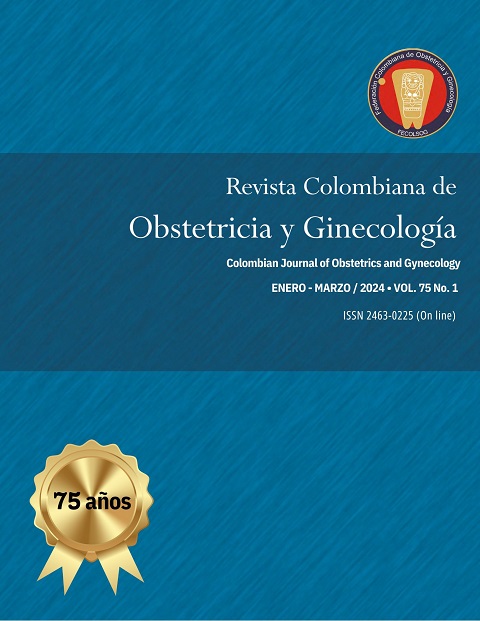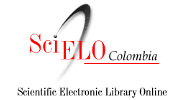Consenso colombiano para el diagnóstico molecular del cáncer de endometrio
DOI:
https://doi.org/10.18597/rcog.4060Resumen
Objetivos: el programa Cancer Genome Atlas Research (TCGA) desarrolló la clasificación molecular para cáncer endometrial con utilidad pronóstica y terapéutica, la cual ha sido reemplazada por consensos y guías internacionales por la clasificación ProMisE (Proactive Molecular Risk Classifier for Endometrial Cancer) debido a su alto costo. El objetivo de este artículo es presentar recomendaciones a nivel nacional derivadas de un consenso de expertos que permitan unificar e implementar la clasificación molecular para mujeres con cáncer endometrial, mediante un uso racional de recursos y tecnología.
Materiales y métodos: consenso de 36 expertos en oncología clínica, ginecología oncológica, patología y genética con práctica clínica en el territorio nacional. El grupo líder realizó una revisión de la literatura y estructuración de preguntas calificadas de 1 a 9 puntos. Se utilizó la técnica de grupo nominal modificada. Se efectuaron reuniones presenciales con presentaciones magistrales, diálogo deliberativo y votación de cuestionario Google Forms (Google LLC, Mountain View, CA, USA) con análisis y discusión de respuestas. Las respuestas no consensuadas se llevaron a una segunda ronda de votación. Finalmente, se elaboró y revisó el manuscrito final.
Resultados: se formularon siete recomendaciones integrando las respuestas de las panelistas basadas en evidencia, pero ajustadas al contexto y a la realidad colombiana.
Recomendación 1. Se recomienda realizar la clasificación molecular en todos los carcinomas endometriales utilizando los marcadores de inmunohistoquímica como resultados subrogados del perfil molecular inicialmente propuesto en la clasificación del TCGA.
Recomendación 2. Se recomienda la estrategia secuencial de testeo iniciando por los marcadores de inmunohistoquímica (p53, MLH1, MSH 2, MSH6, PMS2) simultáneamente en todas las pacientes, y definir la solicitud del POLE (polimerasa épsilon del DNA) (si se encuentra disponible) de forma diferida de acuerdo con la clasificación de riesgo basado en la pieza quirúrgica.
Recomendación 3. Se recomienda que sea el ginecólogo oncólogo quien solicite el POLE (si se encuentra disponible) de acuerdo con el reporte de patología definitivo. Esta prueba se debe solicitar a todos los cánceres endometriales de estadio I-II, excepto los de bajo riesgo (estadio IA endometrioide de bajo grado sin invasión linfovascular p53 normal) y estadio III-IV sin enfermedad residual, sin afectar la solicitud de los marcadores moleculares subrogados por inmunohistoquímica de acuerdo con la histología.
El consenso propone que la solicitud del POLE se realice posterior a la inmunohistoquímica y de acuerdo con la clasificación del riesgo según las categorías establecidas por la guía ESGO/ESTRO/ESP del 2020.
Recomendación 4. Se recomienda realizar simultáneamente con los otros marcadores de inmunohistoquímica la prueba para receptores hormonales en todas las pacientes con cáncer endometrial y el HER2 en pacientes con p53abn.
Recomendación 5. Se recomienda que los marcadores de inmunohistoquímica (p53, MLH1, MSH2, MSH6 y PMS2) se realicen en la biopsia/legrado endometrial inicial cuando la muestra es adecuada y está disponible. En caso de inmunohistoquímica inicial no concluyente, o discrepancias histológicas entre la patología inicial y definitiva, se recomienda repetir el perfil molecular en la patología quirúrgica. Los marcadores de inmunohistoquímica deben reportarse en el informe de patología de acuerdo con las recomendaciones del CAP (College of American Pathologists), independientemente del tipo de muestra.
Recomendación 6. Se recomienda realizar estudio de metilación de promotor de MLH1 en pacientes con pérdida de expresión de MLH1 en la inmunohistoquímica, acompañado o no de pérdida de expresión de PMS2. Todas las pacientes con déficit de MMR (mismatch repair), deben ser enviadas a genética para descartar síndrome de Lynch.
Recomendación 7. Se recomienda tener en cuenta la clasificación molecular, además de los criterios histopatológicos clásicos para la toma de decisiones de adyuvancia, tal como los incorpora la clasificación de los grupos pronósticos de la guía ESGO/ ESTRO/ESP del 2020.
Conclusiones: es necesario implementar la clasificación molecular de cáncer de endometrio en la práctica clínica acorde al contexto colombiano, dado su valor pronóstico y posiblemente predictivo. Esto permitirá la caracterización de la población colombiana para ofrecer tratamientos guiados de manera individualizada. Se trata de un documento académico y no regulatorio.
Referencias bibliográficas
Lu KH, Broaddus RR. Endometrial Cancer. Longo DL, editor. New England Journal of Medicine. 2020;383(21):2053–64. https://doi.org/10.1056/NEJMra1514010
Sung H, Ferlay J, Siegel RL, Laversanne M, Soerjomataram I, Jemal A, et al. Global Cancer Statistics 2020: GLOBOCAN Estimates of Incidence and Mortality Worldwide for 36 Cancers in 185 Countries. CA Cancer J Clin. 2021;71(3):209–49. ttps://doi.org/10.3322/caac.21660
International Agency for Research on Cancer. Cancer Today- Globocan [Internet]. 2022 Disponible en: https://gco.iarc.who.int/today/en/dataviz/tables?mode=population&sexes=2&cancers=24&types=0&group_populations=0&multiple_populations=1&populations=124_152_191_196_203_208_233_246_250_258_276_300_316_348_352_36_372_376_380_392_40_410_414_428_44_440_442_470_48_512_52_528_540_554_56_578_616_620_630_634_682_702_703_705_724_752_756_780_784_826_840_858_96&multiple_cancers=1
Gu B, Shang X, Yan M, Li X, Wang W, Wang Q, et al. Variations in incidence and mortality rates of endometrial cancer at the global, regional, and national levels, 1990-2019. Gynecol Oncol. 2021;161(2):573–80. https://doi.org/10.1016/j.ygyno.2021.01.036
Bokhman J V. Two pathogenetic types of endometrial carcinoma. Gynecol Oncol. 1983;15(1):10–7. https://doi.org/10.1016/0090-8258(83)90111-7
Colombo N, Creutzberg C, Amant F, Bosse T, González-Martón A, Ledermann J, et al. ESMO-ESGO-ESTRO Consensus Conference on Endometrial Cancer: diagnosis, treatment and follow-up†. Annals of Oncology. 2016;27(1):16–41. https://doi.org/10.1093/annonc/mdv484
Gilks CB, Oliva E, Soslow RA. Poor interobserver reproducibility in the diagnosis of high-grade endometrial carcinoma. American Journal of Surgical Pathology. 2013;37(6):874–81. https://doi.org/10.1097/PAS.0b013e31827f576a
Jamieson A, Barroilhet LM, McAlpine JN. Molecular classification in endometrial cancer: Opportunities for precision oncology in a changing landscape. Cancer. 2022;128(15):2853–7. https://doi.org/10.1002/cncr.34328
Getz G, Gabriel SB, Cibulskis K, Lander E, Sivachenko A, Sougnez C, et al. Integrated genomic characterization of endometrial carcinoma. Nature. 2013;497(7447):67–73. https://doi.org/10.1038/nature12113
Alexa M, Hasenburg A, Battista MJ. The TCGA Molecular Classification of Endometrial Cancer and Its Possible Impact on Adjuvant Treatment Decisions. Cancers (Basel). 2021;13(6): 1478. https://doi.org/10.3390/cancers13061478
Talhouk A, McConechy MK, Leung S, Li-Chang HH, Kwon JS, Melnyk N, et al. A clinically applicable molecular-based classification for endometrial cancers. Br J Cancer. 2015;113(2):299–310. https://doi.org/10.1038/bjc.2015.190
Talhouk A, McConechy MK, Leung S, Yang W, Lum A, Senz J, et al. Confirmation of ProMisE: A simple, genomics-based clinical classifier for endometrial cancer. Cancer. 2017;123(5):802–13. https://doi.org/10.1002/cncr.30496
Kommoss S, McConechy MK, Kommoss F, Leung S, Bunz A, Magrill J, et al. Final validation of the ProMisE molecular classifier for endometrial carcinoma in a large population-based case series. Ann Oncol. 2018;29(5):1180–8. https://doi.org/10.1093/annonc/mdy058
Leon-Castillo A, De Boer SM, Powell ME, Mileshkin LR, Mackay HJ, Leary A, et al. Molecular Classification of the PORTEC-3 Trial for High-Risk Endometrial Cancer: Impact on Prognosis and Benefit From Adjuvant Therapy. J Clin Oncol. 2020;38(29):3388–97. https://doi.org/10.1200/JCO.20.00549
Léon-Castillo A. Update in the molecular classification of endometrial carcinoma. International Journal of Gynecologic Cancer. 2023;33(3):333–42. https://doi.org/10.1136/ijgc-2022-003772
León-Castillo A, Britton H, McConechy MK, McAlpine JN, Nout R, Kommoss S, et al. Interpretation of somatic POLE mutations in endometrial carcinoma. J Pathol. 2020;250(3):323–35. https://doi.org/10.1002/path.5372
McAlpine JN, Chiu DS, Nout RA, Church DN, Schmidt P, Lam S, et al. Evaluation of treatment effects in patients with endometrial cancer and POLE mutations: An individual patient data meta-analysis. Cancer. 2021;127(14):2409–22. https://doi.org/10.1002/cncr.33516
Stelloo E, Nout RA, Osse EM, Jürgenliemk-Schulz IJ, Jobsen JJ, Lutgens LC, et al. Improved Risk Assessment by Integrating Molecular and Clinicopathological Factors in Early-stage Endometrial Cancer-Combined Analysis of the PORTEC Cohorts. Clin Cancer Res. 2016;22(16):4215–24. https://doi.org/10.1158/1078-0432.CCR-15-2878
Stelloo E, Bosse T, Nout RA, Mackay HJ, Church DN, Nijman HW, et al. Refining prognosis and identifying targetable pathways for high-risk endometrial cancer; a TransPORTEC initiative. Mod Pathol. 2015;28(6):836–44. https://doi.org/10.1038/modpathol.2015.43
Singh N, Piskorz AM, Bosse T, Jimenez-Linan M, Rous B, Brenton JD, et al. p53 immunohistochemistry is an accurate surrogate for TP53 mutational analysis in endometrial carcinoma biopsies. J Pathol. 2020; 250(3):336–45. https://doi.org/10.1002/path.5375
Jamieson A, Thompson EF, Huvila J, Gilks CB, McAlpine JN. p53abn Endometrial Cancer: understanding the most aggressive endometrial cancers in the era of molecular classification. International Journal of Gynecologic Cancer. 2021;31(6):907–13. https://doi.org/10.1136/ijgc-2020-002256
Soussi T, Leroy B, Taschner PEM. Recommendations for Analyzing and Reporting TP53 Gene Variants in the High-Throughput Sequencing Era. Hum Mutat. 2014; 35(6):766–78. https://doi.org/10.1002/humu.22561
Proctor L, Pradhan M, Leung S, Cheng A, Lee CH, Soslow RA, et al. Assessment of DNA Ploidy in the ProMisE molecular subgroups of endometrial cancer. Gynecol Oncol. 2017;146(3):596–602. https://doi.org/10.1016/j.ygyno.2017.06.020
León-Castillo A, Gilvazquez E, Nout R, Smit VT, Mcalpine JN, Mcconechy M, et al. Clinicopathological and molecular characterisation of “multiple-classifier” endometrial carcinomas Multiple-classifier endometrial carcinoma. J Pathol. 2020; 250(3):312-322. https://doi.org/10.1002/path.5373
Herrington CS, (ed.), Editorial Board WHOCOT. WHO Classification of Tumours Female Genital Tumours. 5th ed. International Agency for Research on Cancer, 2020.
NCCN Clinical Practice Guidelines in Oncology (NCCN Guidelines®) Uterine Neoplasms Version 2 [Internet]. 2024. Disponible en: https://www.nccn.org/professionals/physician_gls/pdf/uterine.pdf
Concin N, Matias-Guiu X, Vergote I, Cibula D, Mirza MR, Marnitz S, et al. ESGO/ESTRO/ESP guidelines for the management of patients with endometrial carcinoma. Int J Gynecol Cancer. 2021; 31(1):12–39. https://doi.org/10.1136/ijgc-2020-002230
Oaknin A, Bosse TJ, Creutzberg CL, Giornelli G, Harter P, Joly F, Lorusso D, Marth C, Makker V, Mirza MR, Ledermann JA, Colombo N; ESMO Guidelines Committee. Electronic address: clinicalguidelines@esmo.org. Endometrial cancer: ESMO Clinical Practice Guideline for diagnosis, treatment and follow-up. Ann Oncol. 2022 Sep;33(9):860-877. https://doi.org/10.1016/j.annonc.2022.05.009
Murali R, Delair DF, Bean SM, Abu-Rustum NR, Soslow RA. Evolving Roles of Histologic Evaluation and Molecular/Genomic Profiling in the Management of Endometrial Cancer. J Natl Compr Canc Netw. 2018; 16(2):201–9. https://doi.org/10.6004/jnccn.2017.7066
Berek JS, Matias-Guiu X, Creutzberg C, Fotopoulou C, Gaffney D, Kehoe S, et al. FIGO staging of endometrial cancer: 2023. International Journal of Gynecology and Obstetrics. 2023;162(2):383–94. https://doi.org/10.1002/ijgo.14923
Orellana TJ, Kim H, Beriwal S, Bhargava R, Berger J, Buckanovich RJ, et al. Cost-effectiveness analysis of tumor molecular classification in high-risk early-stage endometrial cancer. Gynecol Oncol. 2022;164(1):129–35. https://doi.org/10.1016/j.ygyno.2021.10.071
Orellana T, Kim H, Beriwal S, Taylor S, Smith K, Lesnock J. Cost-effectiveness analysis of tumor molecular testing in stage III endometrial cancer. Gynecol Oncol. 2023; (173):81–7. https://doi.org/10.1016/j.ygyno.2023.04.010
Motter A, Frederick P, Gaffney DK, Giuntoli RI, Han E, Huh WK, et al. NCCN Guidelines Version 1.2021 Cervical Cancer Continue NCCN Guidelines. 2021.
Eskander RN, Sill MW, Beffa L, Moore RG, Hope JM, Musa FB, et al. Pembrolizumab plus Chemotherapy in Advanced Endometrial Cancer. New England Journal of Medicine. 2023;388(23):2159–70. https://doi.org/10.1056/NEJMoa2302312
Mirza MR, Chase DM, Slomovitz BM, dePont Christensen R, Novák Z, Black D, et al. Dostarlimab for Primary Advanced or Recurrent Endometrial Cancer. New England Journal of Medicine. 2023;388(23):2145–58. https://doi.org/10.1056/NEJMoa2216334
Oaknin A, Dusa L, Sullivan R, Pothuri B, Ellard S, Leath C. Preliminary safety, efficacy, and pharmacokinetic/pharmacodynamic characterization from GARNET, a phase I/II clinical trial of the anti–PD-1 monoclonal antibody, TSR-042, in patients with recurrent or advanced MSI-h and MSS endometrial cancer. Gynecol Oncol. 2019;154. https://doi.org/10.1016/j.ygyno.2019.04.04437. Bethesda (MD): National Library of Medicine (US), editor. Lenvatinib in combination with pembrolizumab versus treatment of physician’s choice in participants with advanced endometrial cancer (MK-3475-775/E7080-G000-309 Per Merck Standard Convention [KEYNOTE-775]) . In 2018.
Marabelle A, Le DT, Ascierto PA, Di Giacomo AM, de Jesus-Acosta A, Delord JP, et al. Efficacy of pembrolizumab in patients with noncolorectal high microsatellite instability/ mismatch repair–deficient cancer: Results from the phase II KEYNOTE-158 study. Journal of Clinical Oncology. 2020;38(1):1–10. https://doi.org/10.1200/JCO.19.02105
Favier A, Varinot J, Uzan C, Duval A, Brocheriou I, Canlorbe G. The Role of Immunohistochemistry Markers in Endometrial Cancer with Mismatch Repair Deficiency: A Systematic Review. Cancers (Basel). 2022;14(15):3783. https://doi.org/10.3390/cancers14153783
Xiao JP, Wang JS, Zhao YY, Du J, Wang YZ. Microsatellite instability as a marker of prognosis: a systematic review and meta-analysis of endometrioid endometrial cancer survival data. Arch Gynecol Obstet. 2023;307(2):573-582. https://doi.org/10.1007/s00404-022-06636-8
Cho KR, Cooper K, Croce S, Djordevic B, Herrington S, Howitt B, Hui P, Ip P, Koebel M, Lax S, Quade BJ, Shaw P, Vidal A, Yemelyanova A, Clarke B, Hedrick Ellenson L, Longacre TA, Shih IM, McCluggage WG, Malpica A, Oliva E, Parkash V, Matias-Guiu X. International Society of Gynecological Pathologists (ISGyP) Endometrial Cancer Project: Guidelines From the Special Techniques and Ancillary Studies Group. Int J Gynecol Pathol. 2019 Jan;38 Suppl 1(Iss 1 Suppl 1):S114-S122. https://doi.org/10.1097/PGP.0000000000000496
Modica I, Soslow RA, Black D, Tornos C, Kauff N, Shia J. Utility of immunohistochemistry in predicting microsatellite instability in endometrial carcinoma. Am J Surg Pathol. 2007;31(5):744–51. https://doi.org/10.1097/01.pas.0000213428.61374.06
Uribe AG, Julio N, Muñoz M, Ruiz Gómez F, Ospina Martínez ML, Gómez Lopez MG. Informe Tecnico. Sexta Edicion. Desigualdades Sociales en Salud en Colombia. 2015.
Ricaurte Guerrero O, Sarmiento Lacera L. Manejo Inicial de Muestras Para Estudios de Anatomía Patológica. Manual de Procedimientos. Instituto Nacional de Salud. Santa Fe de Bogotá; 1993.
Gómez López A, Eliana I, Arellano S, Aponte CP. Orientaciones técnicas para la implementación de la RIAS para la población con riesgo o presencia de cáncer con enfoques diferenciales en el marco de los elementos estratégicos de APS. Bogotá D.C.; 2022.
Imboden S, Nastic D, Ghaderi M, Rydberg F, Siegenthaler F, Mueller MD, et al. Implementation of the 2021 molecular ESGO/ESTRO/ESP risk groups in endometrial cancer. Gynecol Oncol 2021;162(2):394–400. https://doi.org/10.1016/j.ygyno.2021.05.026
Betella I, Fumagalli C, Rafaniello Raviele P, Schivardi G, De Vitis LA, Achilarre MT, et al. A novel algorithm to implement the molecular classification according to the new ESGO/ESTRO/ESP 2020 guidelines for endometrial cancer. Int J Gynecol Cancer. 2022;32(8):993–1000. https://doi.org/10.1136/ijgc-2022-003480
Talhouk A, Jamieson A, Crosbie E, Taylor A, Chiu D, Leung S, et al. Targeted Molecular Testing in Endometrial Carcinoma: Validation of a Clinically Driven Selective ProMisE Testing Protocol: International Journal of Gynecological Pathology. International Journal of Gynecological Pathology. Int J Gynecol Pathol. 2023;42(4):353-363. https://doi.org/10.1097/PGP.0000000000000898
Consortium RR. Refining adjuvant treatment in endometrial cancer based on molecular features: the RAINBO clinical trial program. International Journal of Gynecologic Cancer. 2023 Jan 1;33(1):109–17. https://doi.org/10.1136/ijgc-2022-004039
Van Den Heerik ASVM, Horeweg N, Nout RA, Lutgens LCHW, Van Der Steen-Banasik EM, Westerveld GH, et al. PORTEC-4a: International randomized trial of molecular profile-based adjuvant treatment for women with high-intermediate risk endometrial cancer. International Journal of Gynecological Cancer. 2020;30(12):2002–7. https://doi.org/10.1136/ijgc-2020-001929
Tailored Adjuvant Therapy in POLE-mutated and p53-wildtype Early Stage Endometrial Cancer - Full Text View - ClinicalTrials.gov [Internet]. Disponible en: https://clinicaltrials.gov/ct2/show/NCT04705649
Makker V, Rasco D, Vogelzang NJ, Brose MS, Cohn AL, Mier J, et al. Lenvatinib plus pembrolizumab in patients with advanced endometrial cancer: an interim analysis of a multicentre, open-label, single-arm, phase 2 trial. Lancet Oncol. 2019;20(5):711–8. https://doi.org/10.1016/S1470-2045(19)30020-8
Uterine Cancer — Cancer Stat Facts [Internet]. Disponible en: https://seer.cancer.gov/statfacts/html/corp.html
Devereaux KA, Steiner DF, Ho C, Gomez AJ, Gilks B, Longacre TA, et al. A Multiplex SNaPshot Assay is a Rapid and Cost-Effective Method for Detecting POLE Exonuclease Domain Mutations in Endometrial Carcinoma. Int J Gynecol Pathol. 2022;41(6):541–51. https://doi.org/10.1097/PGP.0000000000000841
Kanopiene D, Smailyte G, Vidugiriene J, Bacher J. Impact of microsatellite instability on survival of endometrial cancer patients. Medicina (Kaunas). 2014 ;50(4):216–21. https://doi.org/10.1016/j.medici.2014.09.002
Ruz-Caracuel I, Ramón-Patino JL, López-Janeiro Á, Yébenes L, Berjón A, Hernández A, et al. Myoinvasive Pattern as a Prognostic Marker in Low-Grade, Early-Stage Endometrioid Endometrial Carcinoma. Cancers (Basel). 2019;11(12). https://doi.org/10.3390/cancers11121845
Haruma T, Nagasaka T, Nakamura K, Haraga J, Nyuya A, Nishida T, et al. Clinical impact of endometrial cancer stratified by genetic mutational profiles, POLE mutation, and microsatellite instability. PLoS One. 2018;13(4). https://doi.org/10.1371/journal.pone.0195655
Fitzgibbons PL, Bartley AN, Longacre TA, Broaddus R, Chuang LT, Cohen MB, et al. Template for Reporting Results of Biomarker Testing of Specimens From Patients With Carcinoma of the Endometrium Version: Endometrium Biomarkers 1.2.0.1 Template With guidance from the CAP Cancer and CAP Pathology Electronic Reporting Committees. Summary of Changes v1.2.0.1 Updated the Background Documentation (Notes) v1.2.0.0 Added HER2 Reporting Changed IHC Interpretation to include “for Mismatch Repair.” [Internet]. 2019. Disponible en: https://documents.cap.org/protocols/cp-femalereproductive-endometrium-biomarker-19-1200.pdf
Zhang Y, Zhao D, Gong C, Zhang F, He J, Zhang W, et al. Prognostic role of hormone receptors in endometrial cancer: A systematic review and meta-analysis. World J Surg Oncol [Internet]. 2015 Jun 25;13(1):1–12. doi: https://doi.org/10.1186/s12957-015-0619-1
Vermij L, Powell M, Leon-Castillo A, et al 397 Molecular profiling of NSMP high-risk endometrial cancers of the PORTEC-3 trial – prognostic refinement and druggable targets International Journal of Gynecologic Cancer 2021;31:A89-A90. https://doi.org/10.1136/ijgc-2021-ESGO.137
van Weelden WJ, Massuger LFAG; ENITEC; Pijnenborg JMA, Romano A. Anti-estrogen Treatment in Endometrial Cancer: A Systematic Review. Front Oncol. 2019 May 7;9:359. https://doi.org/10.3389/fonc.2019.00359
Togami S, Sasajima Y, Oi T, Ishikawa M, Onda T, Ikeda SI, et al. Clinicopathological and prognostic impact of human epidermal growth factor receptor type 2 (HER2) and hormone receptor expression in uterine papillary serous carcinoma. Cancer Sci. 2012;103(5):926–32. https://doi.org/10.1111/j.1349-7006.2012.02240.x
Zhao S, Choi M, Overton JD, Bellone S, Roque DM, Cocco E, et al. Landscape of somatic single-nucleotide and copy-number mutations in uterine serous carcinoma. Proc Natl Acad Sci U S A. 2013; 110(8):2916–21. https://doi.org/10.1073/pnas.1222577110
Vermij L, Horeweg N, Leon-Castillo A, Rutten TA, Mileshkin LR, Mackay HJ, et al. HER2 Status in High-Risk Endometrial Cancers (PORTEC-3): Relationship with Histotype, Molecular Classification, and Clinical Outcomes. Cancers (Basel). 2020;13(1):1–14. https://doi.org/10.3390/cancers13010044
Buza N. HER2 Testing in Endometrial Serous Carcinoma: Time for Standardized Pathology Practice to Meet the Clinical Demand. Arch Pathol Lab Med. 2021;145(6):687–91. https://doi.org/10.5858/arpa.2020-0207-RA
Erickson BK, Najjar O, Damast S, Blakaj A, Tymon-Rosario J, Shahi M, et al. Human epidermal growth factor 2 (HER2) in early stage uterine serous carcinoma: A multi-institutional cohort study. Gynecol Oncol. 2020; 159(1):17–22. https://doi.org/10.1016/j.ygyno.2020.07.016
Fader AN, Roque DM, Siegel E, Buza N, Hui P, Abdelghany O, et al. Randomized Phase II Trial of Carboplatin-Paclitaxel Compared with Carboplatin-Paclitaxel-Trastuzumab in Advanced (Stage III-IV) or Recurrent Uterine Serous Carcinomas that Overexpress Her2/Neu (NCT01367002): Updated Overall Survival Analysis. Clin Cancer Res. 2020;26(15):3928–35. https://doi.org/10.1158/1078-0432.CCR-20-0953
Meric-Bernstam F, Makker V, Oaknin A, Oh DY, Banerjee S, González-Martín A, et al. Efficacy and Safety of Trastuzumab Deruxtecan in Patients With HER2-Expressing Solid Tumors: Primary Results From the DESTINY-PanTumor02 Phase II Trial. Journal of Clinical Oncology. 2024;42(1):47–58. https://doi.org/10.1200/JCO.23.02005
Talhouk A, Hoang LN, McConechy MK, Nakonechny Q, Leo J, Cheng A, et al. Molecular classification of endometrial carcinoma on diagnostic specimens is highly concordant with final hysterectomy: Earlier prognostic information to guide treatment. Gynecol Oncol. 2016;143(1):46–53. https://doi.org/10.1016/j.ygyno.2016.07.090
Chapel DB, Yamada SD, Cowan M, Lastra RR. Immunohistochemistry for mismatch repair protein deficiency in endometrioid endometrial carcinoma yields equivalent results when performed on endometrial biopsy/curettage or hysterectomy specimens. Gynecol Oncol. 2018;149(3):570–4. https://doi.org/10.1016/j.ygyno.2018.04.005
Weiss JM, Gupta S, Burke CA, Axell L, Chen LM, Chung DC, et al. NCCN Guidelines® Insights: Genetic/Familial High-Risk Assessment: Colorectal, Version 1.2021: Featured Updates to the NCCN Guidelines. Journal of the National Comprehensive Cancer Network. 2021;19(10):1122–32. https://doi: 10.1164/jnccn.2021.0048
Holter S, Hall MJ, Hampel H, Jasperson K, Kupfer SS, Larsen Haidle J, et al. Risk assessment and genetic counseling for Lynch syndrome – Practice resource of the National Society of Genetic Counselors and the Collaborative Group of the Americas on Inherited Gastrointestinal Cancer. J Genet Couns. 2022;31(3):568–83. https://doi.org/10.1002/jgc4.1546
Cómo citar
Descargas
Descargas
Publicado
Número
Sección
Licencia
Derechos de autor 2024 Federación Colombiana de Obstetricia y Ginecología (FECOLSOG)

Esta obra está bajo una licencia internacional Creative Commons Atribución-NoComercial-SinDerivadas 4.0.
| Estadísticas de artículo | |
|---|---|
| Vistas de resúmenes | |
| Vistas de PDF | |
| Descargas de PDF | |
| Vistas de HTML | |
| Otras vistas | |
















